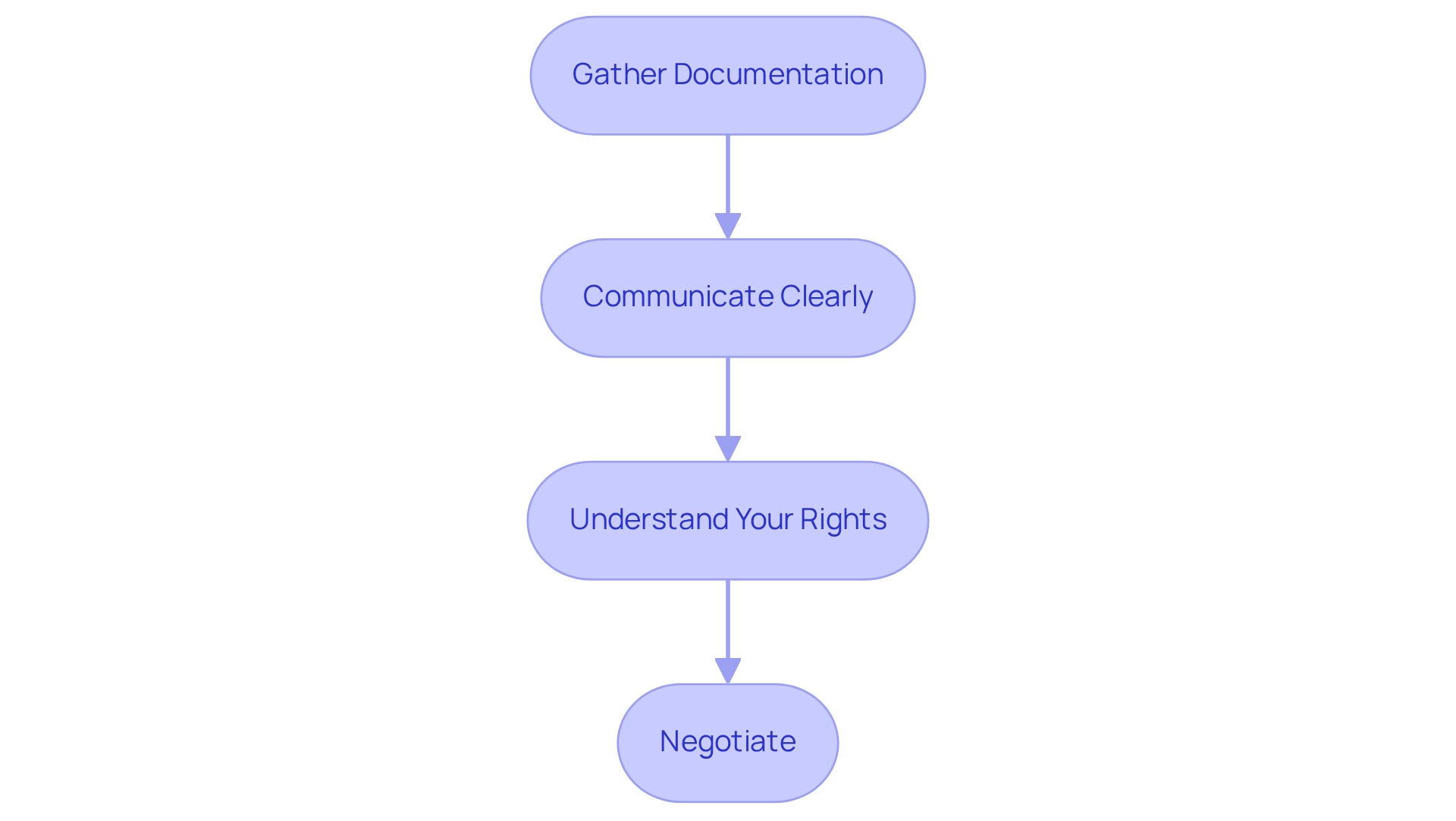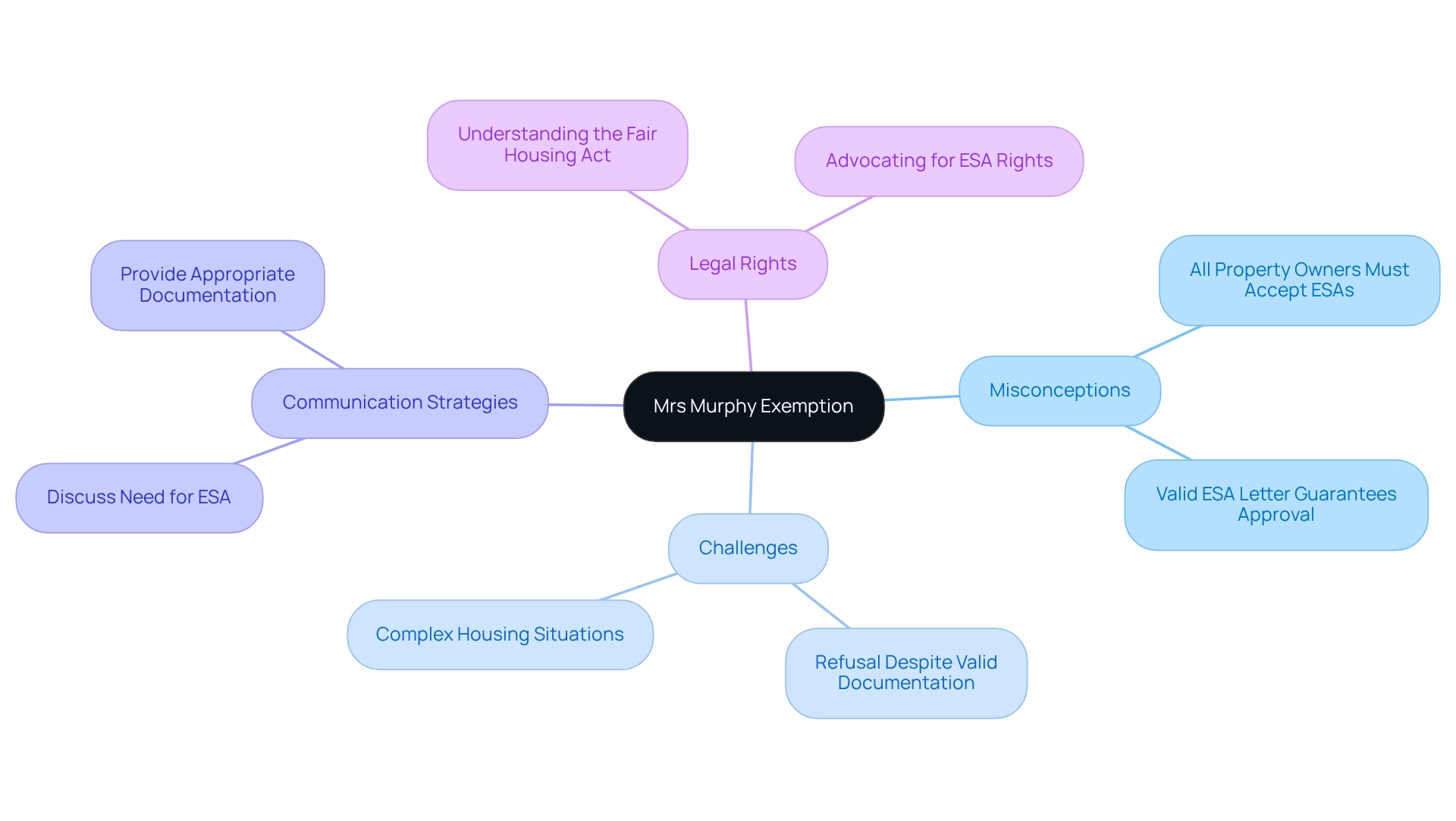

Master the Mrs Murphy Exemption for Pet Owners’ Rights
by Lena Park
Last updated: July 6, 2025
Verified and Approved by:
Angela Morris,
MSW, LCSW
Fact Checked

Overview
The Mrs. Murphy exemption presents a significant challenge for small housing providers, allowing them to decline requests for emotional support animals (ESAs). This situation can deeply affect the rights of pet owners in rental scenarios, leaving many feeling vulnerable and unsupported.
It’s essential for pet guardians to grasp the implications of this exemption and the legal framework that surrounds it. Engaging in informed conversations with property owners can be a vital step in navigating potential housing discrimination.
By understanding the landscape and advocating for their needs, pet owners can find a way to ensure their emotional support animals remain a part of their lives.
Introduction
In a world where emotional support animals (ESAs) are cherished companions for many individuals, navigating the complexities of housing regulations can be overwhelming for pet owners. The Mrs. Murphy Exemption, a provision within the Fair Housing Act, permits small landlords to decline requests for ESAs, creating hurdles for those in search of a welcoming home.
It’s vital for pet owners to understand the implications of this exemption, as it not only clarifies their rights but also reveals potential barriers in securing housing. Recent enforcement actions highlight the importance of compliance, making it essential for tenants who rely on their furry friends for emotional support to navigate this legal landscape with care.
By exploring the nuances of the Mrs. Murphy Exemption, pet owners can empower themselves to advocate for their needs and foster positive conversations with landlords, ensuring that their beloved pets can continue to provide the comfort and companionship they so deeply rely on.
Define the Mrs. Murphy Exemption and Its Relevance to Pet Owners
The Mrs. Murphy exemption, a provision within the Fair Housing Act, allows certain small housing providers to decline requests for emotional support animals (ESAs) under specific circumstances. This exemption primarily concerns property owners who have four or fewer rental units and reside in one of them. For pet guardians, it is crucial to understand the implications of the Mrs. Murphy exemption, as this exemption outlines the limits of their rights regarding pet ownership in rental properties. If a property owner qualifies for this exemption, they are not legally obligated to permit ESAs. This can pose significant challenges for tenants who depend on these animals for emotional support.
Recognizing the complexities of this exemption empowers pet guardians to advocate for their rights and navigate potential housing discrimination. Recent enforcement actions by the Department of Housing and Urban Development (HUD) underscore the importance of adhering to the Fair Housing Act, as violations can result in substantial civil penalties for landlords. This situation reinforces the need for pet guardians to be well-informed about their rights and the limitations that may arise from the Mrs. Murphy exemption. By understanding these nuances, individuals can better prepare themselves to seek the emotional support they need while ensuring their rights are respected.
Explore Legal Framework and Implications of the Exemption
Navigating the legal landscape surrounding the Mrs. Murphy exemption can be quite challenging for pet guardians, especially as it intertwines with the Fair Housing Act, which aims to prevent discrimination in accommodation based on disability. This exemption presents a unique hurdle for those with emotional support animals (ESAs), as small property owners can impose certain restrictions that larger providers cannot. Consequently, individuals living in small rental units may struggle to find housing that welcomes their beloved ESAs.
Understanding these legal nuances is essential for pet guardians, as it empowers them to engage in informed discussions with property managers and advocate for their rights. ESAs play a vital role in providing comfort to students with disabilities, alleviating symptoms related to their conditions and highlighting their importance in mental health care. Alarmingly, recent statistics reveal that many small property owners are inconsistent in their compliance with the Fair Housing Act, often due to a lack of understanding of their obligations. This underscores the necessity for pet guardians to be aware and prepared.
Legal experts remind us that while small property owners can invoke the Mrs. Murphy exemption to impose certain restrictions, they must also navigate the complexities of the law to avoid potential violations. Ongoing legal disputes between small property owners and tenants over ESA accommodations further emphasize the need for clarity in this area. For example, a notable case involved a tenant facing eviction because a property owner refused to acknowledge their ESA, resulting in a legal battle that showcased the importance of clear communication and understanding of rights.
By familiarizing themselves with the legal framework, pet guardians can better grasp their rights and the limitations that small landlords may impose, ultimately leading to more productive conversations about ESA accommodations. It is also crucial for pet guardians to understand their responsibilities regarding ESAs in student housing, which includes providing appropriate documentation and ensuring their animals do not disrupt the living environment. Research indicates that individuals with secure attachments to their pets experience 25% lower anxiety levels than those without pets, highlighting the indispensable role of ESAs in mental health care.
Guide Pet Owners on Utilizing the Mrs. Murphy Exemption Effectively
To effectively utilize the mrs murphy exemption, pet owners must first assess their housing situation to determine if their property owner qualifies for this exemption. Engaging in a respectful and informed dialogue with the property owner about the necessity of an emotional support animal (ESA) is crucial. Here are essential steps to follow:
- Gather Documentation: Secure a valid ESA letter from a licensed mental health professional, clearly outlining your need for the animal. This documentation is vital, as it serves as a legal basis for your request and is essential for accessing the benefits of having an ESA.
- Communicate Clearly: Start a discussion with your property owner, offering a brief description of your circumstances. Highlight the therapeutic benefits of your ESA, which can significantly alleviate symptoms of anxiety, depression, or PTSD, thereby promoting your mental health and well-being.
- Understand Your Rights: Acquaint yourself with local real estate regulations and the Fair Housing Act, which safeguards individuals with disabilities. Understanding your rights will empower you during negotiations and help you articulate your position effectively. Notably, the maximum civil penalty for a third or subsequent violation of the Fair Housing Act is $98,935, underscoring the seriousness of compliance.
- Negotiate: Be prepared to discuss potential compromises, such as agreeing to a pet deposit or additional fees. This flexibility can foster a positive outcome and demonstrate your willingness to cooperate.
Statistics show that a considerable number of pet guardians successfully negotiate with landlords concerning ESAs, with 64% of respondents labeling ‘pet rent and pet fees’ as an ‘extremely’ important factor in their decision to acquire an ESA letter. Moreover, effective communication strategies are crucial; case studies indicate that therapy dog programs in educational environments have enhanced emotional well-being and engagement, with a reported 60% adoption rate of these initiatives in U.S. colleges, implying that similar methods can be advantageous in discussions regarding accommodation.
By following these steps and utilizing the mrs murphy exemption, pet owners can advocate for their rights while ensuring their emotional support animals are accommodated in their living situations.
“Thanks to Wellness Wag, I was able to obtain my ESA letter swiftly and effortlessly, which made all the difference in my living arrangement. I highly recommend their services!”
To get started with obtaining your ESA letter, visit Wellness Wag today and take the first step towards ensuring your emotional support animal is recognized in your housing situation.

Address Challenges and Misconceptions Surrounding the Exemption
Pet owners often encounter significant challenges and misconceptions regarding the mrs murphy exemption. Many believe that all property owners must accept emotional support animals (ESAs), regardless of how many rental units they manage. In truth, small property owners can invoke the mrs murphy exemption to limit their obligations under the Fair Housing Act (FHA). Additionally, some pet guardians mistakenly think that possessing a valid ESA letter guarantees approval from property managers. However, property owners still hold the right to refuse based on the exemption, complicating housing situations for those who rely on the emotional support of their pets.
To navigate these challenges effectively, it’s essential for pet owners to be informed about their legal rights and the specifics of the mrs murphy exemption. Open communication with property owners is vital; discussing the need for an ESA and providing appropriate documentation can foster understanding and cooperation. Moreover, statistics reveal that many landlords refuse ESAs despite valid documentation, underscoring the importance of being prepared to advocate for one’s rights. By grasping these nuances, pet owners can better advocate for their emotional support animals and work towards securing their housing needs.

Conclusion
Navigating the complexities of the Mrs. Murphy Exemption is crucial for pet owners who depend on emotional support animals. This provision within the Fair Housing Act allows small landlords to decline ESA requests, which can create significant barriers for tenants seeking accommodating housing. By understanding the legal framework surrounding this exemption, pet owners are better equipped to advocate for their rights and engage constructively with landlords.
Clear communication and proper documentation are essential when discussing ESAs with landlords. Gathering the necessary paperwork and articulating the therapeutic benefits of their animals can help pet owners foster a more positive dialogue. Moreover, knowing one’s rights under housing laws empowers tenants to negotiate terms that may facilitate the acceptance of their emotional support animals.
Despite common misconceptions about landlords’ obligations regarding ESAs, pet owners can overcome challenges by remaining informed and prepared. Awareness of the nuances of the Mrs. Murphy Exemption not only clarifies rights but also enhances the ability to navigate housing discussions. Ultimately, by advocating for their needs and fostering understanding, pet owners can ensure that their beloved companions continue to provide the emotional support they require in their living environments.
Frequently Asked Questions
What is the Mrs. Murphy exemption?
The Mrs. Murphy exemption is a provision within the Fair Housing Act that allows certain small housing providers, specifically those who own four or fewer rental units and reside in one of them, to decline requests for emotional support animals (ESAs) under specific circumstances.
Who does the Mrs. Murphy exemption affect?
The exemption primarily affects property owners who qualify by owning four or fewer rental units and living in one of those units, as well as tenants who depend on emotional support animals.
Are property owners with the Mrs. Murphy exemption required to permit emotional support animals?
No, if a property owner qualifies for the Mrs. Murphy exemption, they are not legally obligated to permit emotional support animals.
What challenges do tenants face regarding the Mrs. Murphy exemption?
Tenants who rely on emotional support animals may face significant challenges in securing housing, as property owners with this exemption can legally refuse their requests for ESAs.
Why is it important for pet guardians to understand the Mrs. Murphy exemption?
Understanding the Mrs. Murphy exemption empowers pet guardians to advocate for their rights and navigate potential housing discrimination, helping them to be better prepared in seeking the emotional support they need.
What enforcement actions have been taken regarding the Fair Housing Act?
Recent enforcement actions by the Department of Housing and Urban Development (HUD) highlight the importance of adhering to the Fair Housing Act, as violations can lead to substantial civil penalties for landlords.
How can knowledge of the Mrs. Murphy exemption benefit pet guardians?
By understanding the nuances of the Mrs. Murphy exemption, pet guardians can better prepare themselves to ensure their rights are respected while seeking emotional support.
Certify Your Emotional Support Animal Today

Why You Can Rely on Us?
At Wellness Wag, we believe your pet deserves care rooted in both science and compassion. Each article is carefully researched, written in clear language for pet owners, and then reviewed by qualified professionals to ensure the information is evidence-based, current, and practical for real-life care. Our goal is to help you feel confident in making informed decisions about your pet’s health and well-being.
Reviewed by
Angela Morris, MSW, LCSW
Angela is a licensed clinical social worker with 20 years of experience in patient advocacy and community mental health. She has assisted numerous clients with ESA evaluations and brings a deep understanding of disability accommodations, ensuring that all information is accurate, supportive, and practical.

Written by :
Lena Park
Last Updated :
July 6, 2025












